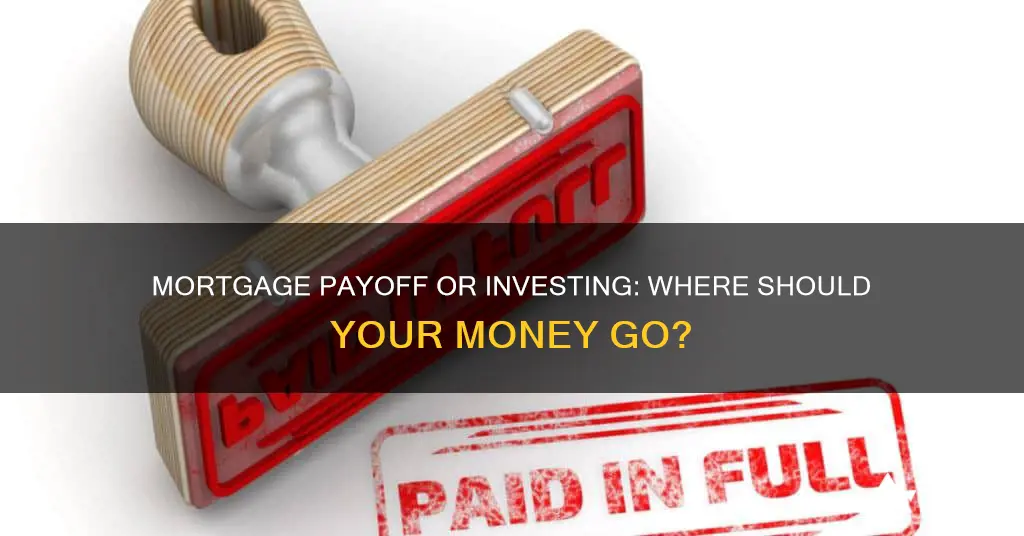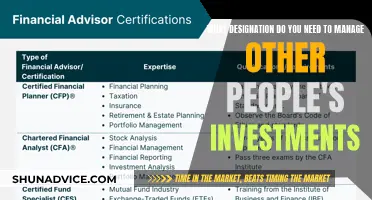
Paying off your mortgage or investing your money elsewhere is a complicated decision that depends on your financial situation, risk appetite, and life stage. While paying off your mortgage early can save you thousands in interest and provide peace of mind, investing can offer higher returns and better liquidity. So, should you pay off your mortgage or invest?
| Characteristics | Values |
|---|---|
| Risk tolerance | Important to consider your comfort level and how conservative you want to be. |
| Mortgage status | More beneficial for newer owners to be aggressive with their mortgage payments. If you're well into a 30-year mortgage, you may be paying more of the principal and less interest, which can allow a shift in focus to investing. |
| Savings | Important to assess your financial situation and ensure you have enough liquid assets to cover your needs and any unexpected expenses. |
| Interest rate | If the interest rate is high, it is a priority to pay it off. If it is low, it may be better to invest. |
| Emotions | Being uncomfortable with the idea of debt is understandable, but it shouldn't drive your financial planning. |
| Retirement | If you're close to retirement, it's a priority to pay off your mortgage. |
| Tax deductions | Paying off your mortgage means losing a tax deduction on mortgage interest. |
| Peace of mind | Paying off your mortgage can ease your burden and provide security. |
| Equity | Paying down your mortgage faster means building equity in your home more quickly, which can help with refinancing. |
| Opportunity cost | Paying off your mortgage faster means missing out on other financial goals. |
| Liquidity | Property is an illiquid asset, so wealth is tied up and not easily converted to cash. Stocks, bonds and similar investments offer better liquidity. |
What You'll Learn

Weigh up the interest saved vs potential investment gains
Weighing up the interest saved against potential investment gains is a key consideration when deciding whether to pay off your mortgage or invest.
Interest saved by paying off your mortgage early
Paying off your mortgage early can save you thousands of dollars in interest payments. The amount of interest you pay is front-loaded, so the earlier you are in your mortgage, the more of your monthly payment goes towards interest rather than principal. Therefore, paying off your mortgage early can be especially impactful in the early years of your loan.
Potential investment gains
The stock market has historically returned an average of about 10% annually. Therefore, if your mortgage rate is less than 10%, you could gain more by investing. For example, if you have a 30-year mortgage of $200,000 with a fixed rate of 4.5%, you'd spend a total of $164,813 in interest over the life of the loan. However, if you invest $300 per month in an index fund that tracks the S&P 500, you'd have $160,780 at the end of 19 years (assuming an average annual return of 8%). That's more than double your potential interest savings.
Other factors to consider
- Risk tolerance: Paying off your mortgage is traditionally a safer, more predictable move. Investing in the stock market is inherently riskier, but it gives you the potential to earn more.
- Peace of mind: If you're uncomfortable with the idea of debt, paying off your mortgage early could ease your burden and provide a sense of security.
- Tax deductions: Paying off your mortgage early means you can no longer take a tax deduction on your mortgage interest.
- Liquidity: Property is an illiquid asset, so if you need cash quickly, it's easier to sell stocks or similar investments than to sell your home.
- Retirement savings: If you haven't saved enough for retirement, it's generally advisable to prioritise maxing out contributions to your retirement accounts before paying off your mortgage.
- Interest rate: If you have a low-interest-rate mortgage, any money you put into investments is likely to provide a higher return than what you'd save by paying off your mortgage.
- Time horizon: If you're close to retirement, paying off your mortgage can help reduce your overall monthly living expenses. On the other hand, if you only plan to own your home for the short term, it may be better to only make minimal mortgage payments to protect yourself from a possible housing market downturn.
- Other debts: If you have other high-interest debts, such as credit card debt or student loans, it may be better to focus on paying those off first.
Unlocking Opportunities: Why Open an Investment Portfolio
You may want to see also

Assess your risk appetite
When deciding whether to pay off your mortgage or invest, it's important to assess your risk appetite or tolerance. This is your ability to stomach the ups and downs of the market, or more directly, your willingness to endure loss.
If you have a low risk appetite, paying off your mortgage early could be the best option for you. This is a more predictable and safer move, as you know exactly how much you're saving. You can also save thousands of dollars in interest payments. However, you need to consider the opportunity cost of not investing your money, as well as the potential loss of tax benefits associated with mortgage interest deductions.
On the other hand, if you have a higher risk appetite, investing your money may be a better option. Historically, the average annual return for stocks is 8%, and the S&P 500 has returned an average of about 10%. If your mortgage rate is less than 10%, you could earn more by investing than by paying off your mortgage early. Additionally, investing in stocks, bonds, and other market instruments provides you with more liquidity compared to investing in real estate. However, it's important to remember that investing in the stock market comes with higher risk and potential for loss.
Ultimately, the decision to pay off your mortgage or invest depends on your individual financial circumstances and your comfort with taking on risk.
Finance and Investment Management: Strategies for Success
You may want to see also

Consider the impact on your tax liability
Paying off your mortgage early can have a significant impact on your tax liability. Generally, mortgage interest is tax-deductible, which can result in a lower tax bill. However, if you pay off your mortgage early, you may lose this tax benefit. This is because the tax deduction only applies if you itemize your deductions, and it may no longer be advantageous for you to do so if your mortgage interest is no longer a significant expense.
Additionally, if you pay off your mortgage with a large lump sum, you may be subject to prepayment penalties, which can impact your overall tax position. These penalties are based on the outstanding principal balance and are typically imposed by lenders if the mortgage is paid off within the first few years of the loan.
On the other hand, investing may also have tax implications. For example, if you invest in a retirement account, you may be able to take advantage of tax breaks and employer-matching contributions. However, investment gains are generally taxable, and you may need to pay capital gains tax on any profits you make. Therefore, it is essential to consider the potential tax consequences of both paying off your mortgage early and investing when making your decision.
Consulting a financial advisor or tax professional can help you understand the specific tax implications of your choices and how they fit within your overall financial goals and tax strategy. They can provide personalised advice based on your unique circumstances, ensuring you make a well-informed decision.
Investment Management Consultants: Guiding Your Financial Journey
You may want to see also

Evaluate your financial goals and priorities
Evaluating your financial goals and priorities is key to deciding whether to pay off your mortgage or invest. Here are some factors to consider:
- Risk tolerance: Paying off your mortgage is generally considered a safer option as it's predictable and you know exactly how much you're saving. On the other hand, investing comes with a certain level of risk and uncertainty, especially in the stock market. Consider your risk appetite and how comfortable you are with potential fluctuations in investment returns.
- Stage of mortgage payments: If you're in the early years of your mortgage, your payments are mostly covering the interest on the loan. Making extra payments during this stage can significantly reduce the total interest owed over the life of the loan. However, if you're well into a long-term mortgage (e.g., a 30-year mortgage), you're likely paying more towards the principal and less towards interest, which may free up some funds for investing.
- Interest rates: Compare the interest rate on your mortgage with potential investment returns. If your mortgage rate is high, paying it off early can save you a significant amount in interest. Additionally, consider the opportunity cost of investing instead—if the expected investment returns are higher than your mortgage interest rate, investing may be more beneficial.
- Financial situation: Assess your overall financial situation, including your savings, income, and other debts. Ensure you have sufficient liquid assets to cover your needs and unexpected expenses. If you have high-interest debt, such as credit card debt, it's generally advisable to prioritise paying that off first.
- Retirement planning: Consider your retirement goals and ensure you're on track with your retirement savings. Investing in tax-advantaged retirement accounts, such as a 401(k) or IRA, can be more beneficial than paying off your mortgage early, as you cannot borrow for retirement but you can take out a loan for a mortgage.
- Peace of mind: For some people, the idea of being debt-free and owning their home outright is a priority. Paying off your mortgage can provide a sense of security and reduce financial stress, especially as you approach retirement.
- Tax implications: Paying off your mortgage early may result in losing tax benefits associated with mortgage interest deductions. Weigh the tax implications of both options, as they can impact your overall financial situation.
- Liquidity: Investments like stocks and bonds offer higher liquidity compared to home equity. If having quick access to cash is important to you, investing may be a better option than tying up your money in your home.
India's Agricultural Neglect: A Policy Choice?
You may want to see also

Consult a financial advisor
Consulting a financial advisor is a good idea when you're unsure about whether to pay off your mortgage or invest. They can help you weigh the pros and cons of each option based on your unique financial situation, goals, and risk tolerance. Here are some factors a financial advisor might consider:
- Financial situation and goals: A financial advisor will assess your income, expenses, savings, investments, and financial goals. They can help you determine if paying off your mortgage early is feasible and aligns with your short-term and long-term financial objectives.
- Interest rates and market conditions: The interest rate on your mortgage and the expected returns on potential investments are crucial factors. A financial advisor can help you compare these rates and evaluate the potential benefits of each option.
- Risk tolerance: Different individuals have different levels of comfort with risk. A financial advisor can help you understand your risk tolerance and how it should influence your decision. For example, investing in the stock market offers higher potential returns but also carries more risk than paying off a mortgage.
- Tax implications: Paying off your mortgage early can affect your tax deductions. A financial advisor can guide you through the tax implications of both options and help you make an informed decision.
- Retirement planning: If you're nearing retirement, a financial advisor can help you assess the pros and cons of paying off your mortgage early versus investing more for retirement. They can advise you on how to balance your financial goals and ensure a comfortable retirement.
- Other debts: A financial advisor will consider your complete financial picture, including any other debts you may have, such as student loans or credit card debt. They can help you prioritize debt repayment and investing accordingly.
- Emergency fund: It's important to have sufficient savings set aside for unexpected expenses. A financial advisor can help you determine if you have adequate emergency funds and guide you in allocating your money effectively.
Remember, a financial advisor will provide personalized advice based on your unique circumstances. They can help you weigh the financial and emotional aspects of both options and make a well-informed decision about paying off your mortgage or investing.
Equity Index: A Smart, Diversified Investment Strategy
You may want to see also
Frequently asked questions
Pros
- You could save thousands or tens of thousands of dollars in interest payments.
- You may experience peace of mind and less financial burden.
- You'll build equity in your home more quickly, which can help you qualify for refinancing.
- You can leverage your equity in the form of a home equity loan or home equity line of credit (HELOC).
Cons
- You may deplete your savings.
- You could miss out on investment opportunities with higher returns, such as the stock market.
- You'll lose tax deductions on mortgage interest payments.
- Depending on your lender, you may incur a prepayment penalty.
Pros
- You'll likely benefit from higher returns compared to mortgage rates.
- Your money will be in a liquid investment that can be easily sold and accessed.
- If you invest in a retirement account, you may receive perks like an employer match and tax breaks.
Cons
- There is a higher risk of losing money in the stock market.
- You will have less money to put towards paying off debt.
- You may feel uncomfortable having debt to your name.
- Do you have sufficient emergency savings?
- Are you putting away enough for retirement?
- How much other debt do you carry?
- What are your prospects for increasing your income?
- What are your financial goals and priorities?
- What is your risk tolerance?
- How does your mortgage rate compare to expected portfolio returns?
- Build an emergency fund to prepare for unexpected expenses.
- Pay off other high-interest debt, such as credit card debt or student loans.
- Consult a financial advisor to help you make a personalised plan based on your financial situation and goals.







